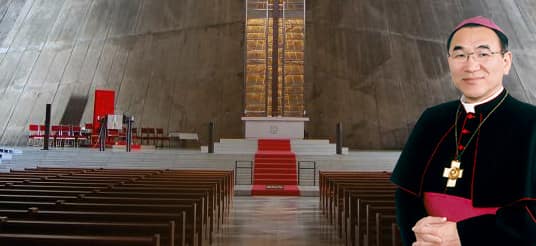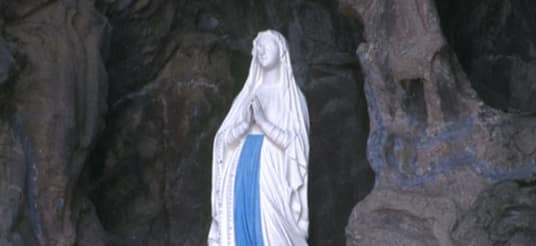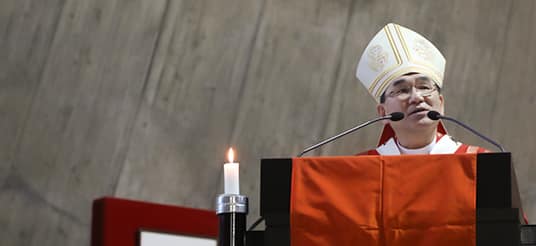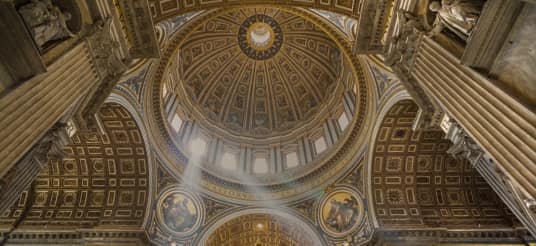Archbishop

UNDER THE MOTTO OF UNITY IN DIVERSITY
02/08/2018
⇒Click here to download the English version
Under the motto of ‘Unity in Diversity’, I was installed as the Archbishop of Tokyo in December of last year. Our Tokyo Archdiocese is not just an organization within society, but a faith community together forming the Body of Christ. Moreover this community of faith, having received the mission command from Christ, must exist as a Gospel proclaiming community in the midst of modern society. It is when each and every church community that forms our diocese lives out the Gospel and walks together in joy with the Lord Jesus present in the Word and in the Eucharist, then the whole diocesan community becomes a missionary community alive in the gospel. For this each church community must be conscious of its diversity and with this consciousness it is essential all together to be united as one.
As only half a year has passed since my installation and I haven’t yet been able to visit the whole diocese, I cannot present concrete guidelines for pastoral care and evangelization at the moment. However starting with unity in diversity as our foothold, I would like to clarify as much as possible the direction of the guidelines for pastoral care and evangelization from here on.
1: Diversity and Unity
St. Paul writes in his letter to the Romans, “Just as each of our bodies has several parts and each part has a separate function, so all of us, in union with Christ, form one body, and as parts of it we belong to each other.” (Romans 12:4-5)
First of all, each of us with our rich individuality is living out the life granted to us. This world is made up through bringing together our various individuality, the same as when parts of one body are formed together to make the whole. Naturally there are many people having views quite different from our own, as they possess a variety of ways of thinking and their own sense of values. For each of us to live in a community actually means to live amidst diversity. A non-uniform, rich society will be realized precisely through the diversity of its members.
Of course this diversity, a diversity of parts giving life to the whole body, is individuality living out the abundance of gifts granted from God who leads us to the common good.
At the same time within this diversity, we are sought out to be united.
As written in John’s Gospel, “May they all be one, Father, may they be in us, as you are in me and I am in you.” (John 17:21) Also as written in the Letter to the Corinthians, “In the one Spirit we were all baptized, Jews as well as Greeks, slaves as well as citizens, and one Spirit was given to us all to drink.” (1 Corinthians 12:13)
As the Son and the Father are one, we are called to be united in the one body. Above all as followers of Christ we are summoned by Word and Sacrament to be united in the Body of Christ.
As written in the same letter to the Corinthians, “When we bless the cup at the Lord’s Table, aren’t we sharing in the blood of Christ? And when we break the bread, aren’t we sharing in the body of Christ? And though we are many, we all eat from one loaf of bread, showing that we are one body.” (1 Corinthians 10:16-17)
Also when the two disciples on their way to Emmaus, felt ‘their hearts burn within them’ at the words of Jesus and had their eyes opened at the breaking of the bread, they set out to be reunited with their brothers and sisters left in Jerusalem. (Luke 24:13-34) These two disciples were led both by Word and Sacrament to be united with their brothers and sisters in the Body of Christ.
2: Evangelizing Church Community
The Gospel is not a treasure hidden away only for ourselves who gather at the Church. As Pope Francis points out in the following from “The Joy of the Gospel”:
“The salvation which God has wrought, and the Church joyfully proclaims, is for everyone. God has found a way to unite himself to every human being in every age. He has chosen to call them together as a people and not as isolated individuals. No one is saved by himself or herself.” (The Joy of the Gospel 113)
Moreover the Pope states, “The Church must be a place of mercy freely given, where everyone can feel welcomed, loved, forgiven and encouraged to live the good life of the Gospel.” (The Joy of the Gospel 114)
The Pope continues it is the Holy Spirit “who brings forth a rich variety of gifts, while at the same time creating a unity, which is never uniformity but a multifaceted and inviting harmony. Evangelization joyfully acknowledges these varied gifts which the Holy Spirit pours out upon the Church.” (The Joy of the Gospel 117)
Therefore as the church community of Tokyo diocese, we strive to choose the way of daily growth for our gospel proclaiming community, where mercifully no-one is excluded, diversity is accepted, our abundance of God-given gifts are made full use of and we are united as one people led by the Holy Spirit.
Incidentally Pope Benedict XVI pointed out the three essential duties of the Church in his encyclical ‘God is Love’.
“The Church’s deepest nature is expressed in her three-fold responsibility: of proclaiming the word of God (kerygma-martyria), celebrating the sacraments (leitourgia), and exercising the ministry of charity (diakonia). These duties presuppose each other and are inseparable.” (God is Love 25)
Speaking of our own diocesan community, I consider it indispensable that these three duties are fully embodied. Also these three duties do not exist unrelated to each other, but because they ‘presuppose each other and are inseparable’ it is necessary to deepen the mutual relationship between the three duties within the diocesan community.
And here guided by the three essential duties of our Church, I would like to present several points which I think may be necessary for fostering our evangelizing church communities and to realize diversity in unity. Based on my current limited information, these do not form a final policy rather a tentative review of the subject matter. I would like to begin efforts to determine some practical steps for these points, having received the views of lay people, religious and priests, who are wrestling with these issues in the field, and through mutual consultation build up my discernment.
3-1: Proclaiming the Word of God
First above all, for us the greatest priority is proclaiming the Gospel. The church community as a functioning organization addresses a variety of issues and at the same time is daily being asked for a flexible response to the reality that enfolds our church. While occupied with responding to these demands and needs, we can be tempted to postpone to a later time our duty of proclaiming the Gospel that we must place as our greatest priority. However whatever way we look at it, the command from our Lord Jesus himself to preach the Gospel is the greatest priority and is not a task that we can postpone for later.
To prioritize proclaiming the Gospel, in reality, there are many issues, but among these I would like to come to grips with the following matters.
1: To cross the religious congregation ‘fence’ and enhancing pastoral cooperation within the diocese.
2: To review and clarify the direction of pastoral care for resident foreigners.
3: To develop and enrich ongoing faith formation.
4: To review and assess the current Catholic
Mission District system.
5: Cooperation between diocese/parish and local Catholic Institutions.
3-2: Celebrating the Sacraments
According to the Constitution of the Sacred Liturgy of Second Vatican council, liturgy is “the outstanding means whereby the faithful express their lives, and manifest to others, the mystery of Christ and the real nature of the true Church.” (2) In addition the document continues with, “While the liturgy daily builds up those who are within into a holy temple of the Lord, into a dwelling place for God in the Spirit, to the mature measure of the fullness of Christ, at the same time it marvelously strengthens their power to preach Christ, and thus show forth the Church to those who are outside as a sign lifted up among the nations.”(2)
Enriching the liturgy of our church communities is indispensable for the spiritual growth of each one of us as well as indispensable for power filled Gospel proclamation.
There are many issues that come to mind, but out of these I would like to deal with the following points.
6: To foster spiritually enriched communities, not only a richness of events.
7: To enhance richness of the liturgy reflecting the diversity of the faith.
8: To enhance richness of the liturgy valuing cultural diversity.
3-3: Exercising the Ministry of Charity
In the Acts of the Apostles, the state of the early Church is described as follows.
“The faithful all lived together and owned everything in common; they sold their goods and possessions and shared out the proceeds among themselves according to what each one needed.” (Acts 2:44-45)
From the beginning the Church as a community practiced love and supported each other. It is important that each Christian individually implements acts of charity, at the same time the Church as a whole “cannot neglect the service of charity any more than she can neglect the Sacraments and the Word.” (God is Love 22)
In the Tokyo Archdiocese there are many people as individuals involved in a wide variety of charitable service. Also there are various projects within the Archdiocese. After taking all things into consideration, I think we need to thoroughly review the charitable ministry of the whole diocesan community.
Here I would like to deal with the following points.
9: To review and strengthen cooperation of ‘Ministry of Charity’ in the whole diocese.
10: To enhance preparation for future disasters by learning from our dealings with the Tohoku Earthquake.
4: Regarding some Individual Topics
I cannot yet describe concretely in detail each specific topic, but I would like to present an outline on the first three topics, which I think are important.
4-1: Crossing the religious congregation ‘fence’ and enhancing pastoral cooperation within the diocese
There are currently 24 male religious congregations and missionary societies and 60 female religious congregations and lay organization located and active within Tokyo Archdiocese. (2018 Catholic Church Handbook for Japan)
Already in ‘Living out the Gospel Mission’ issued in 2002, there is the expectation of cooperation from religious groups in the organization of Catholic Mission districts.
There is a history within our diocese of several parishes that were founded after beginning their growth as part of a religious community or religious facility. While we highly value the charism of the various religious groups and the priorities of religious life, I expect that we can together seek the possibility of even greater mutual cooperation in order to proclaim the Gospel for the whole diocesan community. I wish we can seek a policy, which is not restricted to mutual cooperation between priests, rather construct a cooperative system with male and female congregations for gospel proclamation and pastoral activity for the whole diocese.
Each religious group is facing the same challenges of aging members, falling numbers, maintenance of facilities and so on. I am considering the establishment of a diocesan level religious group committee where we can share information about these challenges and to support each other.
4-2: To review and clarify the direction of pastoral care for resident foreigners
Looking at Japan as a whole, the number of foreign residents has surpassed 2 million, which means that the scale of foreign residency is actually equal to the number of Japanese working in agriculture.
As for the situation of Tokyo Archdiocese, from before many people of various nationality and ethnic background have been resident here, and among them we see many Catholics.
“The Catholic Bishops’ Conference of Japan at their plenary meeting in 1989 stated in regard to the human rights of foreign workers, this is one aspect of proclaiming the Gospel for the Japanese Church. And in the 1993 publication, ‘Toward the Kingdom of God beyond Borders’ they request efforts on the part of the church in Japan ‘to build up communities that can live together with differences and accept peoples on the move as brothers and sisters in Christ’ ” as printed in the 2010 diocesan newsletter no. 276.
The International Pastoral Center, later to become the Catholic Tokyo International Center, was founded in 1990 to respond to various needs. According to ‘Living out the Gospel Mission’ a diocesan document issued in 2002, ‘Pastoral Care and Support for Foreigners’ was proposed as one of the three priorities of the Archdiocese. This document states the following:
“The Catholic Tokyo International Center (CTIC) is active in dealing with these issues already, and many parishes have responded well to the need of foreigners. There are also many foreign Catholic communities and quite a few parishes celebrate masses in foreign languages. Many of these foreign language masses began simply because there happened to be a priest, who was familiar with a foreign language, resident in the parish at the time. Troubles have occurred in maintaining continuity for these masses, when the originating priest is transferred. This problem forces us to acknowledge that we are not responding as well as we should to the spiritual needs of the foreigners.”
The issues directly related to foreign residents within the diocese are becoming complicated, and as their numbers increase, so the number of issues we have to deal with continues to grow.
CTIC is about to reach 30 years since it began its activities, and as we face our diversifying reality it is necessary to look back and assess what has been achieved during this time.
Though responding to the spiritual needs of the foreigners is important, I think that ties with the local church communities should not be lost, nor should independent communities with no connection to the whole come into being. Particularly with the increasing number of permanent residents, it is necessary to make consideration for children using Japanese as their primary language, and as far as possible to work out a policy where the spiritual needs of the foreigners are addressed within the local church community. Especially I wish to avoid the situation where foreign Catholics move repeatedly for mass from one church to another to wherever liturgy is provided in their own language.
As soon as possible, I would like to assemble those involved with foreign resident pastoral care and foreign language liturgies for an exchange of ideas about the future direction of this ministry.
4-3: Dev
eloping and enriching ongoing faith formation
Also in the 2002 document ‘Living out the Gospel Mission’, ‘Training lay people to live out the Gospel Mission’ is declared as a diocesan priority, and presents the necessity of ongoing faith formation along with the importance of vocation for the laity.
“The present parish relies upon priests too much. There is much work that lay people are able to do. Not only financial and building management, but also tasks related directly to the Church’s Gospel Mission. Such tasks should become the main focus of lay involvement, for example catechetical instruction for all ages, serving during liturgy (including leadership of liturgies and distribution of Holy Communion) visiting sickbeds, outreach to the lonely and suffering, supporting each other’s faith and small group leadership. To obtain satisfactory results for these tasks, the right selection of people is important and offer appropriate training.”
In order for the whole church community to become a community that proclaims the Gospel, it is essential that the formation of the faithful for accomplishing their mission is carried out within and through the many diversities. With proper planning and implementation of this formation, both the diversity and the unity in fulfilling our mission of gospel proclamation is ensured.
Already the diocesan ‘Committee for Ongoing Formation’ has prepared ‘Formation Course for Adult Catechetical Instruction’, a continuing program for the formation of lay leaders to be in charge of adult catechetical classes.
As someone who was in a diocese apart from Tokyo, I am continually amazed by the abundance and variety of workshops and lectures that are held in Tokyo and are announced in the monthly diocesan newsletter. I am afraid to add further to all of these, but for the sake of the diocese, I would like to look forward to an enriching program that fosters leaders at various levels of the church community.
Now related to the above, I would like to bring up specifically one topic concerning a method of lay faith formation. This is the Neocatechumal Way, which has become much discussed.
The Neocatechumal Way (subsequently referred to as the Way) was founded by the Spaniard Kiko Arguello in 1964 as “one of the forms of…Christian initiation and of ongoing education in faith” (from the Statute of The Neocatechumal Way). The Way became active in Japan first in Hiroshima in 1970, then activities spread to Takamatsu Diocese and to several other dioceses.
The Way’s Statute was certified in 2008 by the Pontifical Council for the Laity, and by the end of 2010 the Way also received certification for its catechism from the Congregation for the Doctrine of Faith. Therefore the Way exists under the official approval of the Catholic Church. Already in Tokyo Archdiocese there are people engaged in the faith life of the Way and are enrolled in parishes here.
According to Article 1 paragraph 2 of the Statute of The Way, “The Neocatechumal Way is at the service of the bishop as one of the forms of diocesan implementation of Christian initiation and of ongoing education in faith.” Also in Article 26 paragraph 1 it is up to the jurisdiction of the diocesan bishop “to authorize the implementation of the Neocatechumal Way in the diocese.” Therefore whether the Tokyo Archdiocese does or does not adopt the Way as a method of Christian initiation and of ongoing education in faith, is a matter to be decided by myself as the diocesan bishop.
I will not adopt the Neocatechumal Way as a method of Christian initiation and of ongoing education in faith in Tokyo Archdiocese. Also I do not think this method will be adopted in the near future. In addition I do not intend to rely on some form of established method or specific movement, not limited to the Way, for the faith formation of our church communities.
In the first place, formation of the laity is meaningless unless done mainly within each parish. We do not live out our faith as individuals, rather we live within the community that is the parish, we are called to gather in community as part of God’s people that is the parish, and together we support each as we head towards salvation.We cannot think of a maturity of faith without the existence of the church community.
Within the diocesan community, there are religious congregations, institutes of consecrated life, lay associations, movements and fraternities all with their various charisms, and I think they are indispensable for the spiritual growth of the diocesan community and their diversity is a sign of healthy spirituality.
At the same time with this kind of diversity, I think that if only one specific charism is prioritized and its righteousness overly emphasized, this does not go along with healthy spirituality. I sincerely hope that each group will grow abundantly and be able to support each other within the diocesan community.
Of course when thinking about Gospel proclamation, as well as considering what next for our church communities, with great reliance on the guidance of the Holy Spirit, we cannot always refuse to be changed. While being flexible in our response to our times and reality, without separating from the guidance shown by the Gospel, I would like to explore the way to proclaim the Gospel with courage. The diocesan community no matter how, won’t really be brought to life, unless each believer lives out their unique God- given charism and witnesses to the Gospel in their own way of life.
5: In Conclusion
In the 2002 document ‘Living out the Gospel Mission’, one more priority is recorded. This is “Supporting people who suffer from spiritual and mental injury and illness.” Since this is currently still a major issue, I’m thinking to evaluate our concrete efforts so far under the topic area of ‘Exercising the Ministry of Charity’.
Furthermore as mentioned previously, I think that an evaluation and overall review is essential for Catholic Mission Districts, which is the organization where the diocesan priorities are actually realized.
As for specific plans for this, through hearing opinions from the Council of Priests, the Diocesan Pastoral Council and from other sources, eventually I would like to determine concrete policy for the future. We will start work on this as soon as possible.
I have listed a variety of topics, but most fundamental is that the parishes of Tokyo Archdiocese are seriously implementing gospel proclamation as a community. It can be simply said that our faith life is living this mission.
I humbly ask that you will live with us in the Word of God, walking together on the path of Gospel proclamation.
While trusting in the maternal love of Blessed Mary, mother of the Word of God who became flesh, and mother of the Church, may we imitate the courage of her faith and continue to walk the way that God has revealed to us.





